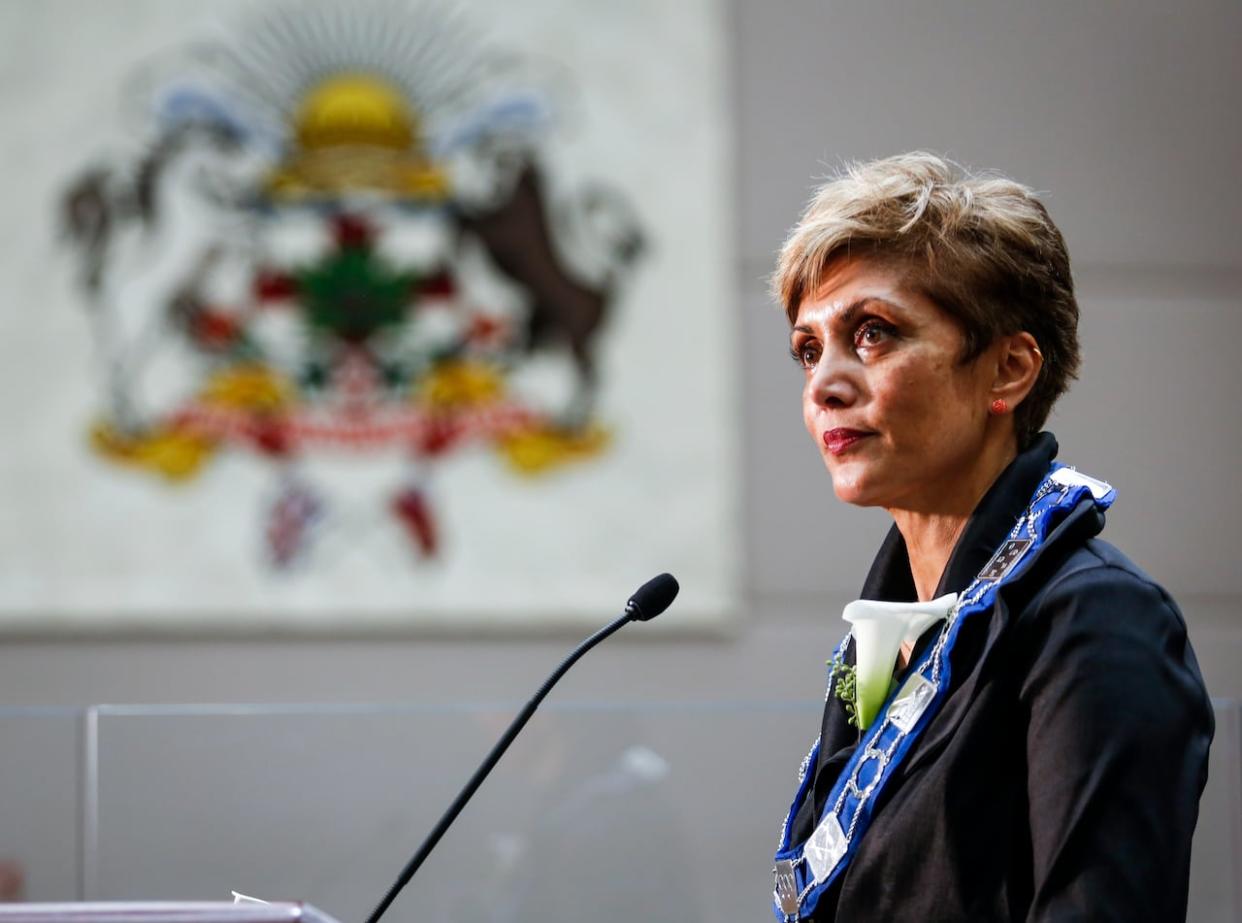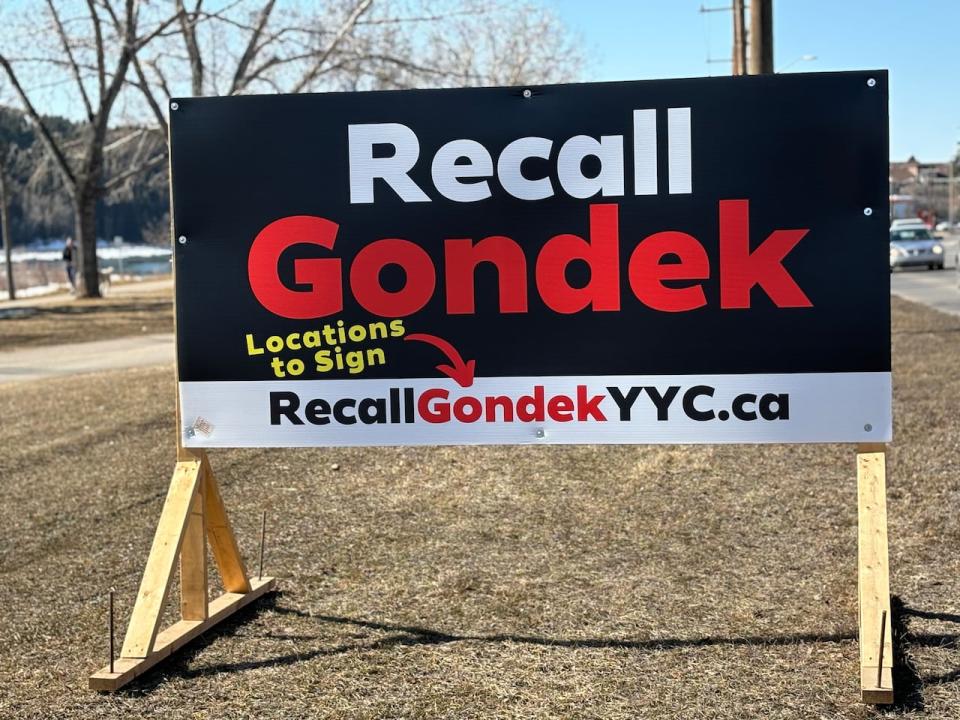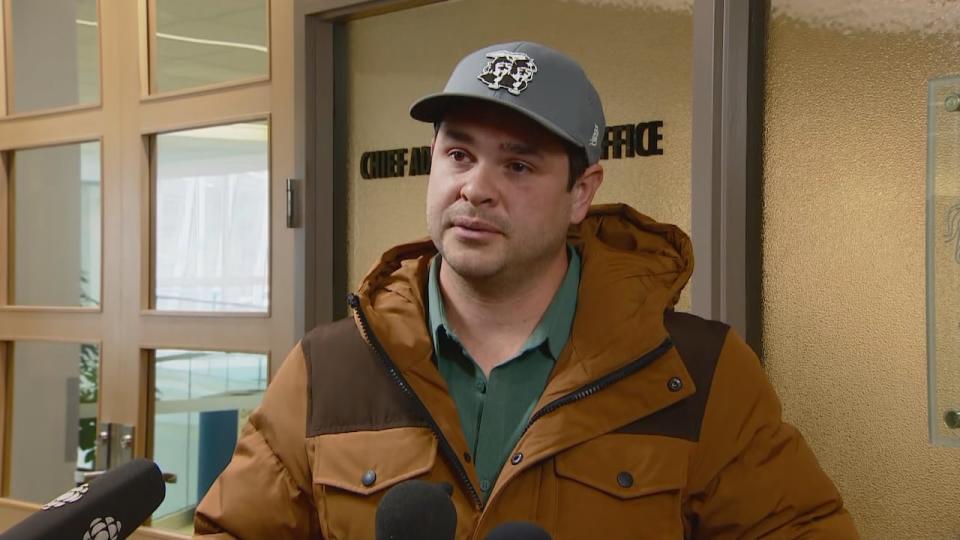Gondek recall petition deadline fast approaching, but verification process far from over

The deadline to submit the recall petition waged against Calgary's mayor is coming this week, but the process is still far from over.
In order for Calgarians to follow how this recall petition could play out over the next few weeks, there are a few key dates and deadlines to watch for.
At 4:30 p.m. on Thursday, local business owner Landon Johnston — the man who initiated the recall petition against Mayor Jyoti Gondek because he's been unhappy with the city's leadership — must submit the petition.
Once submitted, the clerk's office has 45 days to count the signatures. Then, a special city council meeting will be held following the count, which doesn't yet have a set date.
City Clerk Kate Martin told reporters last week that officials will release the number of signatures that were counted during that special council meeting.
Starting Feb. 5, Johnston was given 60 days to get hand-written signatures from a minimum of 40 per cent of Calgary's 2019 population. This means that a total of 514,284 people need to sign the recall petition by April 4 in order for it to even reach the next step, which is verification.
CBC News previously reported that the city was looking to hire as many as 10 clerks who will be paid between $24.96 and $33.38 per hour for up to four months in order to take on the recall petition process.
And while the recall process is set out in provincial legislation that came into force in 2022 under former Premier Jason Kenney's UCP government, municipalities are responsible for paying any associated costs.
Only eligible Calgary electors are allowed to sign the recall petition. But determining whether or not every signature comes from an individual who is eligible to sign isn't actually guaranteed to happen.
Random sample of 369 signatures
"If the 40 per cent threshold has not been met, no further verification process on the petition will occur," said Martin.
Martin says that if the required minimum number of signatures is reached, "the next process will be to conduct a random sample, as permitted under the Municipal Government Act, to do a verification process of the recall petition."
The number of signatures needed to verify the petition would use random statistical sampling, which was determined after the city consulted with a third-party organization.
That magic random sample number is 369 signatures, as opposed to verifying each signature individually. That data would then be extrapolated to estimate the overall total of valid signatures.
"The legislation is very prescriptive in terms of what the city clerk must be counting," said Martin, adding that with every signature there also needs to be an address, contact information, a witness and an affidavit. Forging signatures would contravene the law.
"Should that circumstance arise, it would definitely be a matter for the Calgary Police Service," she said.
LISTEN | Recall petitioner discusses his motivations:
Political analyst and associate professor of policy studies at Mount Royal University, Lori Williams, believes that vetting the signatures would be important regardless of whether or not the threshold is met.
"Of course, experts in statistical sampling set up the chances of error under circumstances like this," said Williams. "Whether that's sufficient to satisfy some people that have a lot of questions, as I think many do, about this particular process, there may be pressure to do a fuller review."
CBC News previously reported that a third-party group known as Project YYC has been helping promote Johnston's recall petition and gather signatures. Its organizers had plans of launching their own petition against Mayor Gondek later this year, part of a broader mission to make Calgary's city council more conservative.
Roy Beyer, Project YYC's leader, is a former activist with the provincial pressure group Take Back Alberta. Beyer told CBC News that Project YYC's recall campaign would have been a coalition effort with other conservative groups. Beyer wouldn't specify which groups, but insisted that Take Back Alberta wouldn't have been one of them.

One of the various recall Gondek signs that were placed around the city. (Laurence Taschereau/Radio-Canada)
Depending on the outcome of the verification process, there may or may not be a byelection, where Calgarians could vote on the next mayor. Gondek would still be allowed to run in that byelection.
'Impossibly high' bar for signatures
Winning the mayoral race in 2021, Gondek received 176,344 votes, representing 45 per cent of the 390,383 total votes cast. Her runner-up, Jeromy Farkas, received 116,698 votes.
Johnston's petition to recall the mayor of Alberta's largest city needs 123,901 more signatures than people who even voted in Calgary's last municipal election.
Comparatively, last year in the Village of Ryley, Alta., a councillor was the first elected official to be successfully ejected from council after 250 of 460 total residents signed the recall petition.
Williams believes the threshold of signatures required is problematic, calling the amount required specific to Calgary "impossibly high."

Local HVAC business owner Landon Johnston speaks to reporters at city hall last month following his 15-minute meeting with Mayor Jyoti Gondek. (Laurence Taschereau/CBC)
According to a post made to X, formerly known as Twitter, Johnston said he's collected over 56,000 signatures as of Tuesday night.
"We were never going to hit the threshold," Johnston told CBC News on Monday. "People know that this is impossible. People know that this isn't going to do anything, but they're traveling hours on the CTrain to find us."
Premier considers changes to legislation
Johnston describes the petitioning process as the most fun he's experienced during the wintertime.
But Johnston says he's also faced various obstacles — mostly, he's concerned about the rules outlined in the legislation.
An email statement from the press secretary for Municipal Affairs Minister Ric McIver says it would be "improper to intervene in an ongoing recall petition," but that the government is reviewing the recall provisions.
And there are also no specified grounds for when a politician is allowed to have a recall petition waged against them, which Williams believes points to further gaps in the legislation.
"Generally recall legislation serves the best purpose when there's a serious question of ethics," she said. "But when it's just a flashpoint for … pretty nebulous anger about a variety of issues, I think it becomes much more difficult to understand what the point is."
During the Your Province. Your Premier radio show on Saturday, Alberta Premier Danielle Smith heard from Johnston, who called in to express his frustration with the recall legislation.
Smith told Johnston she would follow up with him and consider making amendments after the recall petition against Calgary's mayor's deadline passes.
"I think [Smith] does want to talk to me, and hopefully talk to the other petitioners that have filed a petition through the legislation," Johnston said in response to the premier's comments.
"It should never be easy to get rid of an elected official, but it should be fair."
WATCH | Gondek speaks to Canada Tonight before her meeting with Johnston:
Johnston says he's hoping to stay involved in Calgary's political sphere.
"I think the fight is just getting started," he said. "This has ignited something inside of me ... I care about my city. I just care about what's fair. And I'm not going to stop fighting."
As stated in the legislation, an elected official can face only one recall petition per term. If this petition is deemed insufficient, no more recall petitions can be brought forward against Gondek for the remainder of her current term as mayor.


